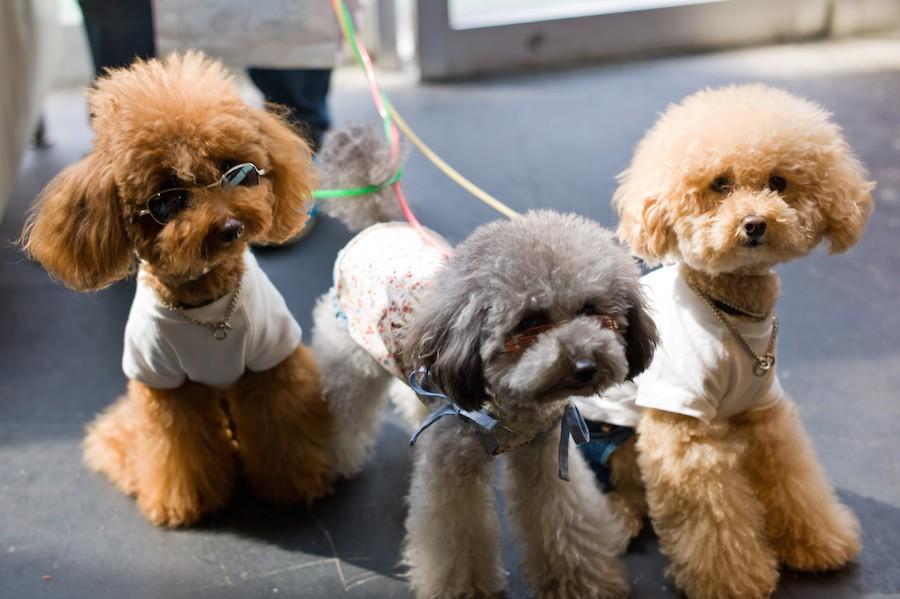Ending the cruelty of the pet industry
Pets seem to be treated like royalty in Japan, as they are dressed in designer jumpers and extravagant collars. In many cases this is true, but on the opposite side of the pet industry’s great admiration for animals is a cruel and unknown reality.
Today, there are more than 22 million pets and 2,400 registered pet breeders in Japan. The problem is that many of the pets have been produced by facilities with inhumane conditions or unregistered operations.
Illegal establishments, including puppy mills and animal hoarders make a quick and abundant profit from the intensive breeding of pets. In order to make the businesses as efficient as possible, these animals are denied basic animal rights such as health care and are treated merely as products.
In 2007, Animal Refuge Kansai (ARK) retrieved 62 severely mistreated dogs from an unethical breeder and pet store in Saga prefecture. Although, it was only after numerous confrontations and protests to officials over multiple years that any action in eradicating the operation took place. Finally in February of 2011, Elizabeth Oliver, founder of ARK, reported that the breeder who caged his dogs in piles of faeces and denied them access to water or exercise was found guilty and fined for his actions. Today, he is still in possession of some dogs, but his facilities are supervised by the police every two weeks for any signs of mistreatment.
Artificial breeding is a phenomenon that does not happen in nature, and thus has significant consequences on the animals bred by this method. In the past, specific breeds of pets have fluctuated greatly in popularity and demand and continue to do so. The Japan Kennel Club reports that this was seen for Chihuahuas in 2001 and Golden Retrievers in the mid-1980’s when they dramatically rose and fell in popularity and demand. Inevitably, breeders jump at these booms by rapidly producing and selling to stores as many of the breed as they can.
To keep up with the demands of society, puppy mills not only inbreed but also over-fertilize the animals of the trending breed. Inbreeding guarantees the pedigree of the offspring for purebreds but also heightens the probability of birth defects. These imperfections make them unsalable to consumers and useless for breeding for fear of replicating the defects, so in the end there is nothing but to push the animals onto animal refuges or have them euthanised or exterminated at the pound.
Each year in Japan, more than 250,000 dogs and cats are euthanised and pounds continue to be endlessly supplied with more animals to exterminate. Especially in a society like Tokyo’s where trends come and go frequently, pet production is a business that is intense and ever changing. Pet stores, therefore, are constantly replacing unsalable unwanted puppies for those younger, and as a result, the pounds that receive these animals must put them down within weeks of their arrival.
The best way to eradicate this issue is by cutting off support of the industry from society. By boycotting pet stores that sell animals from puppy mills, the industry can be shut down and put out of business.
Instead of purchasing new companions from pet shops, people should aim to adopt pets from shelters such as ARK and Heart Tokushima. If there is a preference in pedigree or breed, people can consider highly selective pet stores such as Joker that only obtain animals from reliable and reputable breeders. In addition to helping reduce the demand and extermination of animals, these organisations ensure that the animals are vaccinated and spayed or neutered before they are adopted by people who they determine as adequate caretakers.
Consumers are also encouraged to shop for pet supplies in the same fashion, at stores where pets are not sold along with products, such as at the Green Dog store, which is located in Tokyo Midtown and Daikanyama. Buying products online, such as from Rakuten or Peppy, is also an animal friendly alternative as it provides a way to directly purchase items without supporting pet stores.
People who are not interested in adopting an animal also have the opportunity to join the opposition of puppy mills by donating to refuges, volunteering, and taking part in animal rights events. There are many events that take place in Tokyo such as the Sanpo in the Park charity walk which is annually hosted by Animal Walk Tokyo at Yoyogi Park.
Animal Refuge Kansai also holds adoption fairs each month at various venues including at Shakuji Koen, Fujisawa, Jingumae and Komazawa, where people can interact with animals for adoption and buy ARK products which help to support the animals.
Starting in May was also the monthly Pose and Paws yoga class at which both pet owners and non pet owners who look to get some exercise and support abandoned pets from Fukushima are welcome.
Being connected to animal support organisations such as Peta Asia-Pacific through social media and “liking” or sharing their posts can educate our school community on the issue. It can also serve as a way to keep track of and publicise upcoming events.
Japan should strive to encourage and educate their citizens to bring cruelty of animals to a stop.







































